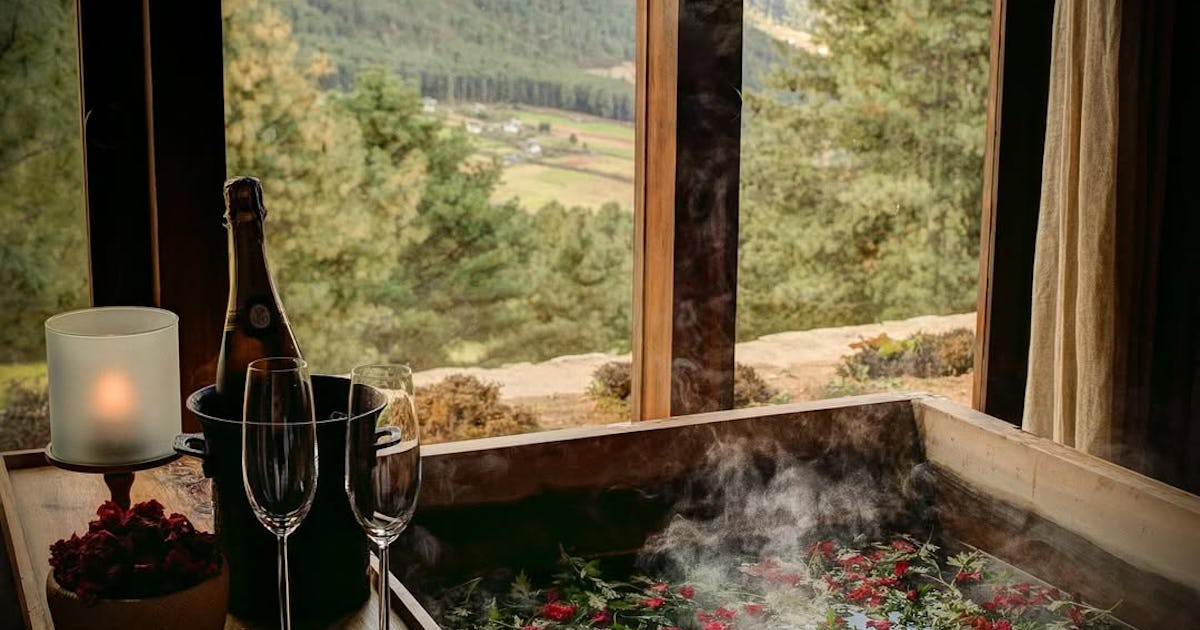
As soon as you land in Bhutan, your blood pressure drops. Maybe it’s the fresh Himalayan air or the rhythmic sound of Buddhist prayer flags flapping in the wind, but in a world that seems devoid of peace and joy, Bhutan is the antidote.
You may have heard of this tiny nation, sandwiched between China and India, for its unconventional approach to its country’s wealth, called Gross National Happiness. This concept was created in the 1970s by Bhutan’s fourth king as a holistic humanist approach to the country’s development. Its focus isn’t on commercialization or money, but on its citizens’ levels of contentment, something unfathomable in the majority of countries.
“Bhutan is a unique place, in my view, because of the vision of Gross National Happiness,” says Fran Bak, a gong sound healing facilitator and the first international volunteer for Bhutan’s DRZT Foundation, which promotes a plant-based diet lifestyle, mindfulness, and compassion for all living beings.
“There’s emphasis based on Buddhist values, family participation, pride in culture, and love of nature. The pace seems slower; there is a chance to catch your breath and always a friendly smile or ‘Hello, La’ to greet me,” says Bak. “We do not have gun violence in Bhutan; there is a psychological sense of safety when you walk down the street as a woman alone.”
With a population less than 800,000, no traffic lights, and not a single McDonald’s or Starbucks in sight, it’s easy for travelers to revel in the country’s safety and lack of mass commercialization. Instead, people here focus on nature and spirituality, the main reasons most make the journey to what’s referred to as “The Last Shangri-La.”
Even in the capital city of Thimphu, serenity is only minutes away. “My favorite place in Thimphu is Phajoding Monastery. Phajoding sits high above Thimphu, reached only by a tough uphill hike,” says Carissa Nimah, managing director of tourism for Gelephu Mindfulness City. “When you get there, you find dozens of young monks who’ll kick a soccer ball with you and practice their English. It’s super fun with incredible views over Thimphu Valley.”
An eight-hour drive from Thimphu is Bumthang Valley. Known as the spiritual heart of Bhutan, it’s home to some of the country’s oldest temples and monasteries, like Jambay Lhakhang, built in the seventh century. The long, winding journey to Bumthang means you’ll find fewer tourists here and even more space for calm and quiet among the wheat fields. In the country known as “the Switzerland of Asia,” there’s plenty of local beer, cheese, and apples after a hike to Padtselling Monastery with views over the valley.
In the lush Punakha Valley, the plush, safari-like tents of Pemako Punakha cascade down 60 acres of forest on the edge of the Mochu River. Here, travelers are greeted with a visit to the hotel’s resident monk, who recites a welcome chant wishing you peace and happiness. He says, “In Bhutan, happiness is not something we seek outside; it is cultivated within, through the practice of mindfulness, compassion, and contentment. Our way of life is rooted in the Dharma. We honor every moment, respect all beings, and walk gently upon the Earth.”
Pemako Punakha helps guests practice these Buddhist pillars through its various offerings, including morning Bhutanese yoga by the river, hikes through the chili fields, and a visit to Punakha’s grand dzong, a spiritual hub for the country’s most revered monks. “From river walks to the spa, every moment invites stillness. Bhutan’s pristine landscapes create a natural sense of tranquility, and wellness journeys are curated by a Dungtsho using Sowa Rigpa, the ancient healing system,” says general manager Vishal Pradhan. “By departure, guests carry a slower breath, a lighter heart, and a peace that lingers long after the stay.”
But in Bhutan, wellness isn’t about gold-leaf facials or detox diets. Here, things are much simpler and, of course, tied to nature. Hot stone baths are common practice throughout the country, with many farmhouses having their own cedar tubs. River stones are gathered and heated over an open fire for hours before being added to a closed-off section of the large tub. Local medicinal herbs and oils are added to the water, making it an ideal salve after a strenuous hike, on chilly winter days, or when you feel a cold looming.
In the scenic Gangtey Valley, the luxuriously cozy Gangtey Lodge has one of the country’s best hot stone baths. Sequestered in a private house overlooking the farms below, the team here lights dozens of candles along the wall and provides guests with iced tea, fruit skewers, fresh cookies, and plenty of cold towels.
On arrival at the lodge, every traveler is welcomed with a Bhutanese song sung in delicate harmony by the entire team. And after a few days surrounded by the Himalayan vistas and ethereal tranquility, it becomes harder and harder to deny its message: “It is a very happy day today, which brought us all together. Bhutan, our Buddhist country, is like heaven.”
#Bhutan #Travel #Wonders #Happiness #Levels





